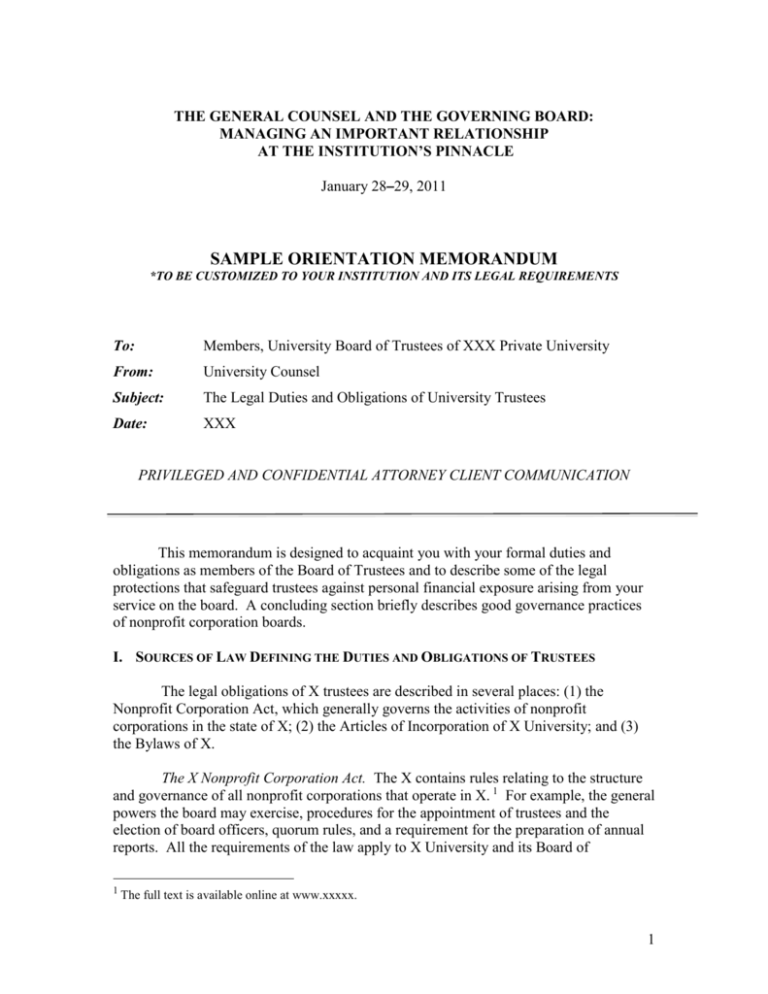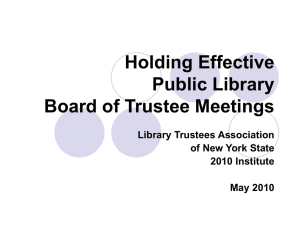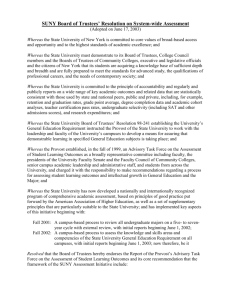University Trustee Legal Duties & Obligations: Orientation Memo
advertisement

THE GENERAL COUNSEL AND THE GOVERNING BOARD: MANAGING AN IMPORTANT RELATIONSHIP AT THE INSTITUTION’S PINNACLE January 28–29, 2011 SAMPLE ORIENTATION MEMORANDUM *TO BE CUSTOMIZED TO YOUR INSTITUTION AND ITS LEGAL REQUIREMENTS To: Members, University Board of Trustees of XXX Private University From: University Counsel Subject: The Legal Duties and Obligations of University Trustees Date: XXX PRIVILEGED AND CONFIDENTIAL ATTORNEY CLIENT COMMUNICATION This memorandum is designed to acquaint you with your formal duties and obligations as members of the Board of Trustees and to describe some of the legal protections that safeguard trustees against personal financial exposure arising from your service on the board. A concluding section briefly describes good governance practices of nonprofit corporation boards. I. SOURCES OF LAW DEFINING THE DUTIES AND OBLIGATIONS OF TRUSTEES The legal obligations of X trustees are described in several places: (1) the Nonprofit Corporation Act, which generally governs the activities of nonprofit corporations in the state of X; (2) the Articles of Incorporation of X University; and (3) the Bylaws of X. The X Nonprofit Corporation Act. The X contains rules relating to the structure and governance of all nonprofit corporations that operate in X. 1 For example, the general powers the board may exercise, procedures for the appointment of trustees and the election of board officers, quorum rules, and a requirement for the preparation of annual reports. All the requirements of the law apply to X University and its Board of 1 The full text is available online at www.xxxxx. 1 Trustees—both of which, to the best of my knowledge, are in compliance with them all. The Articles of Incorporation. 2 X University’s articles of incorporation is the organizational document which formed X University as a corporation. The articles describe among other things the powers and duties of the Board. The articles can be amended by the Board, upon filing any amendments with the State Secretary of State. The Bylaws. Bylaws are defined in the Nonprofit Corporation Act as the rules for the oversight, regulation or management of the affairs of the corporation.3 They will provide more a detailed description of the Board’s structure and managerial responsibilities, and they can be amended, revised, or repealed by the Board at any time in accordance with the procedures specified in the Bylaws. All trustees should read the Bylaws and understand what they mean. An up-to-date copy of the Bylaws is attached to this memorandum as Appendix A. The University Secretary will have a copy of the Bylaws for any trustee who wishes to review them during the course of a meeting. II. THE POWERS OF THE BOARD The powers of the Board of Trustees are spelled out in a single broadly worded paragraph in the Articles of Incorporation: [The Board] shall have power to make such rules, regulations and bylaws and to take such other action … as may be necessary or appropriate for the governance of the corporation and its operations and management of its property and funds, and to exercise all powers granted to non-profit corporations under the laws of the State of X. The Bylaws vests “[a]ll powers of the University” in the Board of Trustees, a grant of authority broad enough to encompass all powers traditionally exercised by the governing boards of America’s private colleges and universities. These powers include: 2 3 • Appointing the President and the fixing of the President’s compensation. • Approving degrees and honorary degrees. • Authorizing changes in tuition and fees. • Acting on the University’s operating and capital budgets. • Approving the sale, purchase, construction or renovation of land and buildings. • Promoting major fund-raising efforts. The full is available online at www.xxxxx. The full text is available online at www.xxxx. 2 • Incurring and securing debts. • Approving institutional policies on faculty appointment, promotion, tenure, sabbaticals and leaves. • Periodically reviewing the University’s mission and the Board’s performance. In keeping with the practice at most institutions of higher education in the Bylaws allow certain Board committees—in particular the Executive Committee—to act for the Board in prescribed areas of institutional governance. For example, the X Committee— rather than the Board as a whole—exercises certain powers over XXXXX. III. YOUR LEGAL DUTIES AS A TRUSTEE A trustee is required to discharge his or her duties in good faith, with due care and in the best interests of the nonprofit corporation.4 The duty to act in good faith and in the best interests of the corporation also is known as “fiduciary duty.” The duty to act with due care means in practical terms that you should be generally familiar with the Bylaws (an obligation satisfied by reading and understanding the Bylaws); and be prepared for, attend, and participate in scheduled meetings of the Board and the committees to which you are assigned. The most important duty you have as a member of the Board of Trustees is your duty as a corporate fiduciary. Under the law of X, a member of a corporate board owes an enforceable legal duty to the corporation to manage its fiscal affairs prudently. A board member who breaches that duty can be held personally liable for any consequent damages the corporation suffers. The following are some examples of breach of fiduciary duty: • • Conflicts of interest or self-dealing: A trustee violates his or her fiduciary duty by knowingly allowing the corporation to enter into a business transaction with an entity (corporation, partnership, etc.) in which he or she has a substantial interest without disclosing that fact to other board members. Failure to exercise independence of judgment: Establishing an executive committee that routinely accepts the recommendations of the president without discussion or debate, establishing a finance committee that does not meet regularly, and generally ceding to the president important financial decision-making authority vested under the bylaws in the board all constitute breaches of a trustee’s fiduciary duties. The University’s conflict-of-interest policy for trustees is designed to ensure that 4 [cite statute here] 3 trustees recognize potential conflicts of interest, disclose them as appropriate, and protect themselves and the institution against the potential adverse consequences of conflicts. IV. PROTECTION AGAINST LIABILITY You are protected in three different ways against personal liability for actions you undertake in your capacity as a member of the Board of Trustees. First, you enjoy the standard protection afforded to all corporate trustees under the “business judgment rule.” Second, under the Bylaws, you enjoy indemnification against claims and law suits that may be filed against you. And third, the University has purchased comprehensive Directors and Officers (“D & O”) liability insurance and you are an insured under X D & O policy. The Business Judgment Rule. The business judgment rule limits court review of Trustees’ actions. In making a business decision, you are presumed to act on an informed basis, in good faith, and in the honest belief that the actions you take are in the best interest of the University. The business judgment rule protects trustees against liability for honest mistakes in judgment, but not for breaches of fiduciary duty occasioned by fraud, gross negligence, or illegal conduct. Indemnification. Indemnification means a legally enforceable assurance under which one person (in this instance, the University) promises to protect another (a member of the Board of Trustees) against liability arising out of the legal consequences of the trustee’s failure to act. The Bylaws provide substantial protection against lawsuits and other claims filed against trustees. Under the Bylaws, trustees are indemnified against claims to the maximum extent permitted by law. This would include claims asserted in any kind of action (civil, criminal, administrative, actual, threatened, pending, or completed) and for money payments in virtually any form (judgments, fines, settlement awards, and attorneys’ fees). There are preconditions, however. You are indemnified only if: (I) The action is brought against you by reason of the fact that you are a trustee. In other words, the University will indemnify you only with respect to actions you take in your capacity as a trustee, not for actions relating to your business or your personal life. (2) You acted in good faith and in a manner you reasonably believed was consistent with the University’s best interests. (3) In a criminal proceeding, you had no reason to believe your conduct was unlawful. (4) You did not receive an improper personal benefit from your actions. 4 Insurance. The University has purchased commercial insurance policies that provide insulation from potential liability for board members. The policies are “Directors and Officers” (“D & O”) liability policies. The policies cover the University as an entity, the President and trustees, and all salaried employees (including faculty members) for their wrongful acts, including errors and omissions. Coverage, therefore, is provided for all individual trustees. The policies provide X million of liability coverage, subject to a per-claim deductible of X. They provide comprehensive protection against judgments, settlements, and defense costs, including attorneys’ fees. Like most policies, the policies contain standard exclusions. It affords no protection against punitive damage awards; liability assumed under contract; liability for tortuous bodily injury; liability for willful or intentional torts; or liability for violations of federal securities or pension laws, among others. All institutional insurance policies are reviewed regularly by the Director of the Office of XXXX to determine whether the current level of insurance protection for the Board and its members is sufficient. V. CORPORATE GOVERNANCE The Sarbanes-Oxley Act of 2002 was one of the governmental reforms enacted to address perceived weaknesses in financial reporting and corporate accountability practices among the nation’s publicly-traded, stock-issuing, for-profit corporations. Most colleges and universities in this country are not directly affected by Sarbanes-Oxley or other reforms. Universities so far have successfully avoided Congressional application to their activities by voluntarily adopting many of Sarbanes-Oxley’s requirements as “best practices.” Audit committee requirements. Sarbanes-Oxley requires public corporations to create audit committees “directly responsible” for retaining and supervising outside auditors. Audit committee members must be independent, meaning that senior management personnel cannot be members. As part of this “independence” standard, audit committee members cannot be paid for consulting or other services provided to the corporation outside of their service as trustees. The Audit Committee of University X and its composition comport with these requirements. Financial certification requirements. Sarbanes-Oxley requires “that the principal executive officer ... and the principal financial officer ... certify in each annual ... report” as to the following: that they have reviewed the report; that the report “does not contain any untrue statement of a material fact” or a material omission; that the financials fairly present the financial condition of the corporation; that the certifying individuals have designed and evaluated systems of internal controls to make sure that they are aware of material information concerning the corporation’s operations; and that the signers have disclosed to the company’s auditors and audit committee deficiencies in controls as well as any fraud involving management or other key employees. This is done at X. There 5 also are Internal Revenue Service requirements for trustees regarding the review of a university’s information return (Form 990), with which this institution complies. Restrictions on senior executive compensation. Internal Revenue Service regulations prohibit unreasonable excessive compensation to employees of nonprofit institutions. The University must comply with the requirements of the Internal Revenue Code regarding executive compensation for officers, key management, as well as others whose position or salary level requires review by the Board for reasonableness. A brief summary of the process for reviewing executive compensation is attached as Appendix B. Required code of financial ethics. Sarbanes-Oxley directs the Securities and Exchange Commission to promulgate rules effectively requiring corporations to adopt “a code of ethics for senior financial officers”. Other laws applicable to the university also require conflict of interest policies for certain officers, trustees and employees. University X has already adopted conflict-of-interest policies and those covering trustees are attached as Appendix C. VI. CONCLUSION By accepting service as a member of the Board of Trustees, you assume the responsibility to be diligent in that service. If you have any questions about these issues, please let me know. 6









